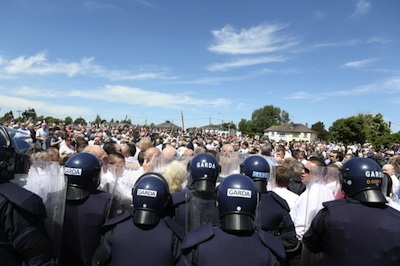
There has been widespread condemnation of the intimidatory and deeply provocative behaviour of 26-County police at the funeral of former Sinn Fein President Ruairi O Bradaigh last Saturday.
As the coffin of the legendary republican leader was brought to the graveside in Roscommon in the Irish midlands, mourners were met by the Gardai in full riot gear and others in regular uniforms who took photographs of those in attendance.
The grave was ringed by Gardai and a phalanx of riot police also pushed themselves deep into the crowd at St Coman’s graveyard.
The move was described as an attempt to prevent the former IRA leader from receiving a potential final salute from his old comrades. However, only respect for the family among the mourners prevented the pushing and shoving from erupting into potential violence.
The previous night, there was also a large number of Gardaí at the O Bradaigh family home where the republican veteran was being waked. Mourners were also photographed there by as they arrived to pay their respects.
For many, the scenes were reminiscent of republican funerals on both parts of the island for the past number of decades. It was also seen as a clear message of intent from the current Fine Gael/Labour government that they will continue to target republicans to the graveside.
RSF President Des Dalton said the Gardai actions had been “disgraceful” and had disrespected the entire O Bradaigh family.
“The heavy gang are alive and well -- but the republican movement is alive also,” he declared.
Mr O Brádaigh, who died at the age of 80, was a former chief of staff of the IRA in the 1950s, and was a TD (member of Parliament) for Longford/Westmeath from 1957 to 1961.
He was once famously described by the FBI in the US as “a dedicated revolutionary undeterred by threat or personal risk.”
During his funeral, the priest described him as “a man for all seasons” who deeply loved his country as well as his family. Speaking from the altar, his son, Conchur, condemned the heavy handed and provocative nature of government policing at the funeral.
A colour party accompanied the cortege to the graveside, where Mr Dalton said in an oration that those present could truly honour his predecessor “by turning our eyes to the future, by pledging ourselves to once more take up the fight for a New Ireland”.
He said that for Ruairi O Bradaigh, “there could be no temporising on the issue of British Rule in Ireland”.
“Drawing on the lessons of Irish history he recognised that it constituted the root cause of conflict and injustice for the Irish people. In opposing the 1998 Stormont Agreement he rightly viewed it as a flawed document serving only to copper-fasten British Rule while also institutionalising sectarianism, thereby further deepening the sectarian divide.”
He added that Mr Ó Brádaigh’s analysis had been borne out by a number of independent studies which have shown an increase in sectarianism in the Six Counties in the years since 1998.
“The economically and politically oppressed and partitioned Ireland of today is far removed from the vision of a New Ireland, which inspired Irish Republicans such as Ruairí Ó Brádaigh,” he said.
He concluded by paying tribute and offering his gratitute to the extended Ó Brádaigh family “for the life of Ruairí and his unparalled contribution to the cause of a free Ireland.”
![[Irish Republican News]](https://republican-news.org/graphics/title_gifs/rn.gif)
![[Irish Republican News]](https://republican-news.org/graphics/title_gifs/harp.gif)

